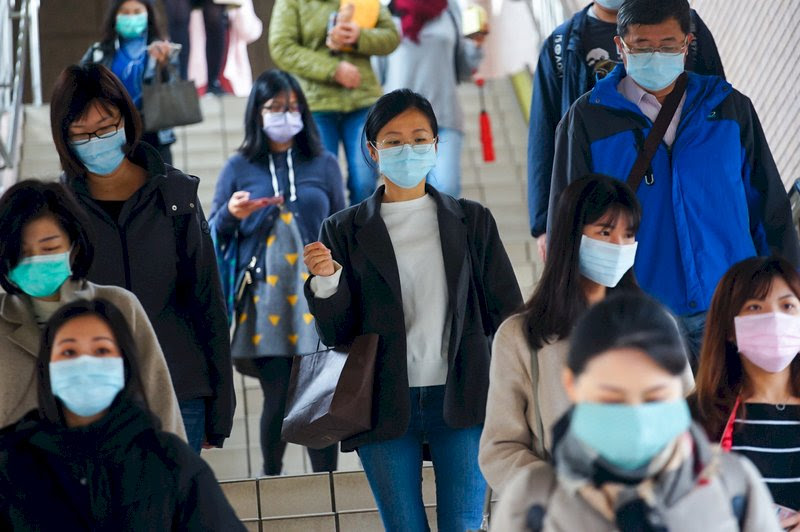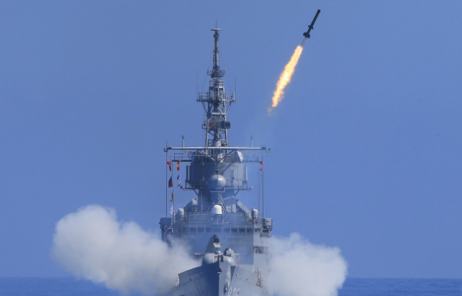|
Posted: 31 Mar 2020 10:06 AM PDT
Radio Taiwan International
Date: 31 March, 2020 By: John Van Trieste 
Taiwan has so far recorded 322 cases of COVID-19.
Fourteen of the new cases are imported, brought in by people with a recent history of travel to the US, the UK, Iceland, France, Switzerland, Thailand, and the Philippines. The remaining two cases are of domestic origin. The first of these can be traced to contact with another person who had recently been to Turkey and later tested positive for COVID-19. In the second case, the source of infection is unclear. However, health authorities have come up with a list of 13 people who had recently come into contact with this second patient. [SOURCE] |
|
Posted: 31 Mar 2020 10:01 AM PDT
ABC News
Date: March 31, 2020 By: Max Walden 
Print Email Facebook Twitter More
WHO accused of suppressing information about Taiwan’s coronavirus prevention measures By Max Walden Updated about 5 hours ago Space to play or pause, M to mute, left and right arrows to seek, up and down arrows for volume. VIDEO: WHO official Bruce Aylward appears to dodge a question about Taiwan’s membership to the health organisation (ABC News) Along with its Asian neighbours South Korea and Singapore, Taiwan has received near-universal praise for its approach to fighting coronavirus. Taiwan, which has been praised for its COVID-19 response, says WHO is not passing on information it shares with the body Taiwan has been denied observer status at the WHO since 2016 Critics say WHO is too influenced by China, which considers Taiwan part of its territory Despite its proximity to China, where the pandemic started, Taiwan's Centres for Disease Control has reported just over 300 cases of coronavirus. [FULL STORY] |
|
Posted: 31 Mar 2020 09:50 AM PDT
Individuals should maintain distance of 1.5m indoors and 1m outdoors, wear masks on public transport: CECC
Taiwan News Date: 2020/03/31 By: Ching-Tse Cheng, Taiwan News, Staff Writer 
People in Taiwan encouraged to practice social distancing. (Pixabay photo)
At Tuesday's (March 31) daily press conference on the country's latest COVID-19 cases, Health Minister and CECC head Chen Shih-chung (陳時中) encouraged all individuals to follow the recommendations and maintain a social distance of 1.5m indoors and 1m outdoors. He said that the authorities will finalize the guidelines before announcing them on Wednesday (April 1). Chen pointed out that people should sit or queue 1m apart from others and avoid dining with friends or coworkers. For areas that are impossible to implement social distancing, such as trains or Metro Rapid Transit (MRT) stations, people must wear masks, he added. The health minister noted that the government is hoping to treat the guidelines as advice rather than as rules during the initial stages. He urged everyone to comply with the new policy, but he explained that individuals will not be fined unless they intentionally challenge the guidelines, reported the Liberty Times. [FULL STORY] |
|
Posted: 31 Mar 2020 09:46 AM PDT
Focus Taiwan
Date: 03/31/2020 By: Chen Chun-hua, Ku Chuan and Matthew Mazzetta 
Premier Su Tseng-chang (蘇貞昌) / CNA file photo
Such a figure would more adequately reflect the global nature of the crisis than the NT$60 billion special budget the Executive Yuan proposed in February, when the impact of the COVID-19 outbreak was mainly limited to China, Su said. In an interpellation session at the Legislative Yuan, opposition Kuomintang (KMT) Legislator Lee De-wei (李德維) asked Su to detail the timing and scale of response measures being planned by the government, inquiring whether it would seek anything on the scale of Singapore's recently announced S$48 billion (US$33.65 billion) stimulus plan. "The overall scale will likely be around NT$1 trillion," Su said, arguing that the size of various countries' response measures will vary based on a variety of factors. [FULL STORY] |
|
Posted: 31 Mar 2020 09:42 AM PDT
Taipei Times
Date: Apr 01, 2020 By: Chen Wei-tzu and William Hetherington / Staff reporter, with staff writer 
The Council of Grand Justices hears arguments on whether the nation’s law on adultery is unconstitutional in Taipei yesterday.
Photo: George Tsorng, Taipei Times The judges met to discuss Article 239 of the Criminal Code on offenses against marriage and family, after 18 judges had called for a constitutional interpretation of the issue. Taipei District Court Judge Lin Meng-huang (林孟皇) said that while he had previously tried adultery cases and never questioned the law, his feelings changed when trying a case last year involving baseball star Wang Chuan-jia (王傳家). During that case evidence was presented showing Wang naked in bed with a female fan surnamed Tu (杜), which later became public, and Lin felt this was a violation of Wang’s personal privacy, he said. [FULL STORY] |
|
Posted: 31 Mar 2020 09:36 AM PDT
Radio Taiwan International
Date: 31 March, 2020 By: Natalie Tso 
Taiwan continues to fight the coronavirus epidemic and is helping industries cope. (CNA file photo)
He noted that Taiwan’s relief budget of NT$60 billion (nearly US$2 billion) was passed quickly in the legislature. The premier said other aspects of the nation’s relief measures will probably add up to a total of NT$1 trillion (US$33 billion). The premier also said that the government is reducing expenses for the public. The price of gas has gone down 5% and the price for a tank of gas has gone done NT$100 (over US$3). The government is also giving subsidies to taxi and tour bus drivers and other industries to help them get through this epidemic. [SOURCE |
|
Posted: 31 Mar 2020 09:32 AM PDT
Taiwan’s defense procurement strategy makes a lot more sense when viewed through the lens of the U.S. factor.
The Diplomat Date: March 31, 2020 By: Corey Lee Bell 
Credit: Ministry of National Defense, ROC (Taiwan)
Leading up to the election, a number of the Tsai administration’s procurement decisions had already come in for heavy criticism. The opposition candidate Han Kuo-yu, backed by media allies, claimed the DPP was wasting money on white elephants and trophy projects ill-suited to Taiwan’s defensive needs. Particular criticism was directed at the indigenous submarines and Landing Helicopter Deck (LHD) development plans, as well as the decision to purchase 108 M1A2 Abrams Tanks from the United States. Others more pointedly accused Tsai of recklessly stoking cross-strait tensions and adopting a “populist” strategy of promoting “vanity” purchases to bolster support for the government. Some were especially critical of Tsai’s claims that she was the Taiwanese president that has “placed the greatest emphasis on defense,” with the newly formed Left Party subsequently stating it “opposed Tsai Ing-wen’s use of weapons purchases to bolster her election campaign.” Surprisingly, many analysts outside Taiwan agree with these appraisals. A core reason they do so is due to the notable discordance between the government’s new Overall Defense Concept (ODC) and the procurement agenda being pursued by the government. The former, which is widely lauded by international experts, calls for focusing on asymmetric warfare capabilities. The latter appears to be less focused, and while parts of it are aligned with the tenets of the ODC, others are aimed at bolstering Taiwan’s conventional arsenal. Such criticisms do make sense. Asymmetric strategies are those devised to shorten the odds against an opponent one has no chance of matching ship for ship, or aircraft for aircraft — which very much matches Taiwan’s strategic predicament. Yet they come at the cost of appearing militarily powerful — which reflects Tsai’s political quandary. The trade-off comes in the form of sacrificing some capabilities in order to bolster others (typically, offensive for defensive), and being theater-specific, which means losing all-terrain capabilities so as to leverage the natural advantages of a predetermined (and typically proximate) geography. Asymmetric strategies require investing in technologies that give more bang for your buck, that are fit for purpose, and that are — in line with the principles of guerilla warfare — relatively light, mobile, and more capable of evading detection. When properly designed, they are the bane of the generals of powerful belligerents, for while they may not threaten to destroy the enemy’s capacity to fight, they target the cost threshold that could make aggressive action politically unviable. [FULL STORY] |
|
Posted: 31 Mar 2020 09:28 AM PDT
New Taipei man fined NT$400,000 for shirking quarantine to exercise in park, eat at hotpot restaurant
Taiwan News Date: 2020/03/31 By: Keoni Everington, Taiwan News, Staff Writer 
Chen (third from left). (New Taipei Police Department photo)
According to police, the 25-year-old man, surnamed Chen (陳), is from a wealthy family and is currently unemployed. He rented a luxury home in New Taipei City's Banqiao District and went abroad with friends in early March, reported ETtoday. After returning from overseas, Chen was told to undergo a standard home quarantine of 14 days from March 20 to April 5. However, only five days into his quarantine, he apparently became stir-crazy and at about 5 p.m. on March 25, the man went to a nearby riverside park to exercise for about four hours. When police visited his home to check on him, they found that he was nowhere to be found. After waiting for half an hour, Chen finally returned, and officers reported him to the Banqiao District Public Health Center, which levied on him a fine of NT$200,000 for breaking his quarantine, reported UDN. [FULL STORY] |
|
Posted: 31 Mar 2020 09:23 AM PDT
Focus Taiwan
Date: 03/31/2020 By: Sunrise Huang and Lee Hsin-Yin 
CNA file photo
The move to curtail the spread of the COVID-19 coronavirus is crucial, particularly in anticipation of the traffic surge around the April 2-5 Tomb Sweeping Festival, Lin said after an inspection of the country's high speed rail and regular rail services. [FULL STORY] |
|
Posted: 31 Mar 2020 09:19 AM PDT
KEEP AWAY: People should wear a mask in places where they cannot follow social distancing rules, the CECC said, adding that it would publish detailed guidelines today
Taipei Times Date: Apr 01, 2020 By: Lee I-chia / Staff reporter 
People share a public space in Taipei yesterday after the Central Epidemic Command Center recommended that people stay at least 1m apart outdoors and 1.5m apart indoors due to the COVID-19 outbreak.
Photo: CNA Minister of Health and Welfare Chen Shih-chung (陳時中), who heads the center, said that seven of the new cases tested positive upon their arrival at the airport, four were under home quarantine, one was under home isolation and two were under self-health management, while the two domestic cases sought treatment on their own. The domestic cases are a man in his 70s and a man in his 20s who had not traveled abroad recently. The older man, the nation’s 307th case, had a meal with case No. 122, who returned from Turkey on March 13 and tested positive on March 20, he said. Forty-six people have been identified as having had contact with the 307th case, Chen said. [FULL STORY] |
quarta-feira, 1 de abril de 2020
Eye On Taiwan
Assinar:
Postar comentários (Atom)
-
0-12-31 Editor's Picks China moves on to tackle the 'chips' for agriculture An improving domestic seed industry will become a ...
-
View this email in your browser Five risks that could trip the bulls in 2021 By William Pesek At a moment of extreme dislocation and econo...
-
Editor's Picks China leads vaccine R&D As the number of coronavirus infection cases rapidly approaches two mil...




Nenhum comentário:
Postar um comentário